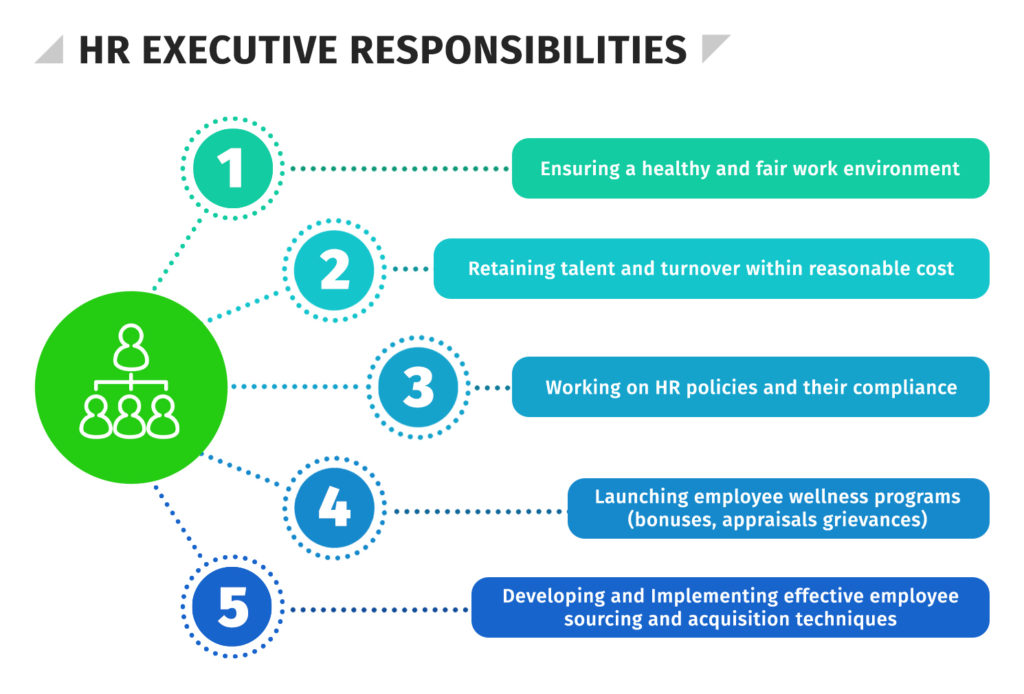Our reviewers evaluate guidance independently using professional best practices. Learn how to post career questions and advice effectively.

Home › HR Career Path ›
An HR Executive overlooks the entire human resources department and its staff.
In addition, they are responsible for ensuring that HR policies are updated and predict when the company needs to launch different hiring processes or alter its human resources management approach.
An HR executive performs the most fundamental procedures of the HR department and handles aspects such as personnel management, social welfare, and the maintenance of HR records.
An HR executive is a crucial member of the HR department, plays an instrumental role in many HR responsibilities, and leads the HR staff to implement various projects.
This article discusses HR Executive jobs in detail and explains the critical duties they have to address. If you want to learn more via video, watch the video below. Otherwise, skip ahead.

The responsibilities of HR Executives vary from organization to organization and depend on their industry-specific experience. As a result, companies often prefer hiring an HR executive with experience in similar industries.
For example, although a particular HR executive possesses better HR skills than other candidates, a healthcare organization would still go with the other candidate if they have more experience managing and hiring medical staff.
You can divide a human resources executive’s job into three categories. Apart from solid technical human resources knowledge, HR Executives must be competent in each category given below:
Since the HR Manager position is also a senior role within the human resources department, it’s easy to confuse it with the HR Executive role.
However, both positions have different scopes and require varying experience and expertise. Therefore, it is helpful to look at the differences to better understand the HR Executive role.
Some of the primary HR Executive responsibilities are given below:
In contrast, here are some fundamental HR Manager responsibilities:
As you can see, an HR Manager works closer to the field and handles practical implementation more than an HR Executive.
Moreover, the most significant difference between the two positions is salary. According to the US Bureau of Labor Statistics, HR Executives have around 100% higher annual wages than HR Managers. However, the predicted job growth for HR Managers until 2028 is 7%, while for HR Executives is 5%.
Since it is a high-level position, HR Executive jobs require significant knowledge about different aspects of the human resources terrain.
Therefore, if you wish to become a competent HR Executive, you should pursue our quality HR certifications at HR University and become knowledgeable in all the essential details of HR.
The duties of an HR Executive vary depending on the size of the employing organization. For example, the individual may have to handle and oversee all the HR work in a small company.
However, the human resources executive won’t have to do much practical work in mid- to large companies and instead manages the HR team.

Every HR Executive’s responsibilities require extensive interpersonal and communication skills and significant adaptability. Additionally, since the HR department keeps records and handles confidential documents, the HR Executive needs solid organizational skills.
Lastly, most of their duties require the executive to be a strong leader with a clear sense of direction for the human resources department.
Here are some of the general duties and responsibilities of an HR Executive, irrespective of the company size:
Other duties and responsibilities are company-specific, and it’s difficult to generalize them concisely. For example, an HR Executive has to overlook the medical staff in a medical organization, which differs from supervising employees in a marketing agency or an IT company.
If the HR Executive doesn’t have experience with the specific industry, it’s always good to learn about the company in advance.
It’s also essential that the HR Executive be aware of any possible employment law changes (state and federal level), shifts in benefit plans, and changes within the company structure.
Legal competency often helps the executive act before an issue arises. As a result, a veteran HR executive can prevent a problem and save the company money and time.
An HR Executive is critical for organizations to have an efficient human resources department. They ensure HR Managers understand innovative strategies and implement them on the ground. Additionally, they must make major HR decisions that help drive the department and the organization forward.
The HR Executive acts as the leader and the leading authority in HR. Therefore, they need to understand the company’s vertical and horizontal structures.
Additionally, they require considerable experience within the human resources field to reach this senior position.
Here are the most frequently asked questions about HR executives.
The role of an HR executive involves overseeing and directing the human resources functions within an organization. They focus on talent acquisition, employee engagement, workforce planning, and the development of HR strategies that align with the company’s goals. HR executives work closely with both HR professionals and business leaders to create a productive and supportive work environment. In larger companies, they may also work with industry leaders to establish best practices for organizational growth and sustainability.
An HR executive is a general term that can apply to senior HR roles within an organization. The chief human resources officer (CHRO), on the other hand, is a more specific title referring to the topmost HR position, typically responsible for making strategic decisions regarding human capital management at the executive level. The CHRO collaborates with other C-suite members to develop and implement the organization’s overall vision and culture.
An HR leader contributes to the company’s success by shaping policies that enhance employee satisfaction and productivity. By implementing effective talent acquisition processes, they ensure that the right individuals are hired, nurtured, and retained. Additionally, HR leaders play a critical role in building a company culture that reflects the organization’s values and supports ongoing professional growth, which ultimately drives overall business performance.
While the titles chief people officer (CPO) and chief human resources officer (CHRO) are often used interchangeably, there can be subtle differences. The CPO tends to focus more on the human side of the workplace, ensuring that employees are happy, engaged, and developing personally and professionally. The CHRO may focus more broadly on all human resources aspects, including compliance, talent management, and workforce planning, while keeping a strong focus on the overall company strategy.
HR professionals who aspire to become industry leaders must develop a diverse skill set that includes strategic thinking, leadership development, and a deep understanding of people management. In addition to these core skills, they should be able to analyze data, understand business operations, and have strong communication abilities. These competencies are essential for those looking to influence the field of human resources and create innovative solutions that will be adopted industry-wide.
Talent acquisition is one of the most critical responsibilities for HR executives because finding the right talent directly affects the organization’s success. An effective talent acquisition strategy ensures that the company hires individuals who have the required skills but also align well with the company’s values and culture. HR executives work to streamline the hiring process, reduce turnover, and create long-term growth opportunities for employees, thereby strengthening the workforce and contributing to the company’s competitive advantage.
If you are new to Human Resources and are looking to break into an HR Executive role, we recommend taking our HR Certification Courses, where you will learn how to build your skillset in human resources, build your human resources network, craft an excellent HR resume, and create a successful job search strategy that lands you a sought-after HR Executive job.
Learn modern and relevant technical writing skills